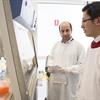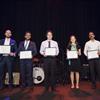Discover the achievements of those within our College and the community who are leading the way on our objective to further tomorrow's medicine today.
 Discoveries and progress by our medical community are supported through our Fellowships, scholarships and grants.
Discoveries and progress by our medical community are supported through our Fellowships, scholarships and grants.
 Prizes are awarded to those who have demonstrated excellence in their field and contributed significantly to the College and medicine.
Prizes are awarded to those who have demonstrated excellence in their field and contributed significantly to the College and medicine.